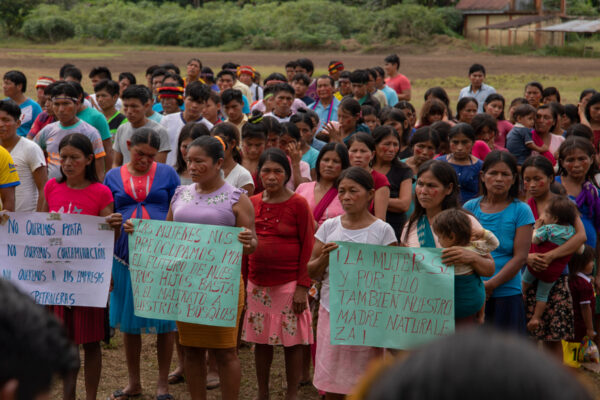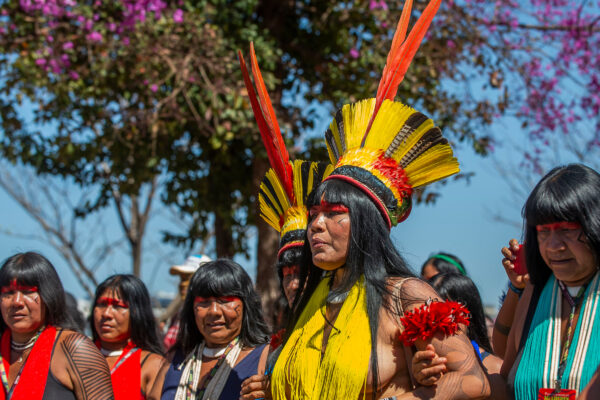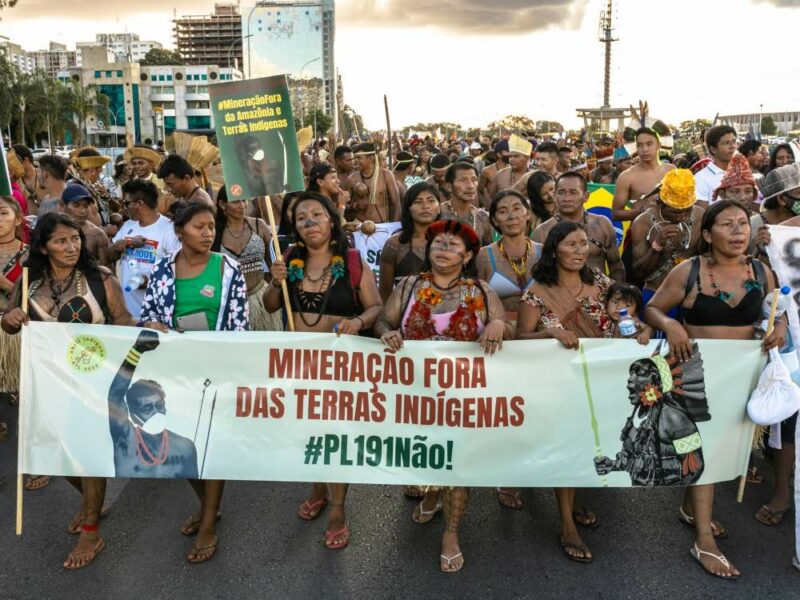Brazil’s President Bolsonaro is using a possible fertilizer shortage caused by Russia’s war on Ukraine to justify his attempt to ram contentious legislation through Congress, by forcing a vote as early as today to schedule a final vote on Bill 191/2020. This legislation would open Indigenous lands to mining and other industrial activities. While mining is illegal on Indigenous territories (of which 98% are in the Amazon), Bolsonaro and his allies claim that these lands must be opened to mineral extraction to fuel Brazil’s powerful agribusiness sector and lessen the country’s dependence on fertilizer imports. The sweeping legislative move is fiercely contested by Brazil’s Indigenous movement and opposed by 86% of Brazil’s public. Indigenous representative Joenia Wapichana warned that Bill 191/2020 could be slated for an urgent scheduling vote today, Wednesday, March 9, 2022, without public debate.
While Bolsonaro claims fertilizer scarcity warrants his government’s aggressive push to promote domestic production, two Brazilian fertilizer factories were sold by the government during his presidency, including one sale to a Russian company. Potassium is a critical ingredient in many fertilizers, and Brazil has several major deposits in the Amazon and in other regions. However, most of the Amazon’s main potash mines are located outside Indigenous lands, and studies show that all of Brazil’s demand for potassium could be satisfied by reserves located primarily outside the Amazon, completely outside of Indigenous lands. One-third of Brazilian potash reserves are in the legal Amazon, while the other two-thirds are concentrated in the states of Sergipe, São Paulo, and Minas Gerais. Only 11% of potash reserves are located on Indigenous lands.
Rosana Miranda, Brazil Campaign Advisor for Amazon Watch, issued the following statement:
“If Brazil hopes to achieve self-sufficiency in fertilizer production, it has no need to mine Indigenous lands and other protected areas to do so. Furthermore, even if mining on Indigenous lands were permitted, making such extraction viable would involve a lengthy process, a reality which doesn’t correspond with the supposed urgency Bolsonaro alludes to. All projects would require licensing, a thorough consultation of affected communities, and massive injections of investment into prospecting and infrastructure construction prior to initiating extraction.”
Background: Bolsonaro’s backing of Canadian mining interests
Bill 191’s passage and the subsequent approval of industrial activities on Indigenous lands could lead to the loss of up to 160,000 km² of forests, an area larger than England. As deforestation skyrocketed during the Bolsonaro administration, with large mining-related deforestation growing 62% between 2018 and 2021, Indigenous lands have served as key buffer zones against spiking forest destruction.
The Bolsonaro government is also lobbying for the interests of Brazil’s agribusiness caucus and for one mining company in particular: Canada’s Potássio do Brasil. The company is one of five corporations profiled in a report recently published by Amazon Watch and the Association of Brazil’s Indigenous Peoples (APIB) entitled Complicity in Destruction IV: How mining companies and international investors drive Indigenous rights violations and threaten the future of the Amazon. The company has a history of environmental destruction and human rights violations and a long-standing interest in mining on Indigenous territories.
Potássio do Brasil’s “Potássio Autazes Project,” slated to be built in the municipality of Autazes in Amazonas state, will require investments of around US$2.3 billion, with the goal of extracting 770 million tons of potassium. This plan is directly related to the company’s close relationship with Brazilian agribusiness interests.
Indigenous rights can be violated before company operations even begin. In the case of Potássio do Brasil, its actions have already ramped up pressure and conflict on local communities near the Potássio Autazes Project. The company has not respected the right to consultation of Indigenous communities, primarily that of the Mura people. Once begun, the activities of Potássio would impact areas of the Jauary and Paracuhuba Indigenous Lands. More than 14,000 Indigenous people could be affected by the project, which risks contaminating water sources the communities need to survive. In November 2020, without the knowledge of Brazilian authorities and before the legal process was finalized for project installation, Potássio do Brasil signed an agreement with the Chinese construction firm CITIC to build a mineral complex in Autazes. The US$1.94 billion contract was signed without any consultation with affected communities. It was recently revealed that in November 2019, executives of the Canadian bank Forbes & Manhattan, controller of Potássio do Brasil and Belo Sun operations, met with Brazilian Vice President Hamilton Mourão to discuss their projects in the country. Since then, Potássio do Brasil’s activities have moved forward, considered “strategic” for Brazil under the Bolsonaro government.












